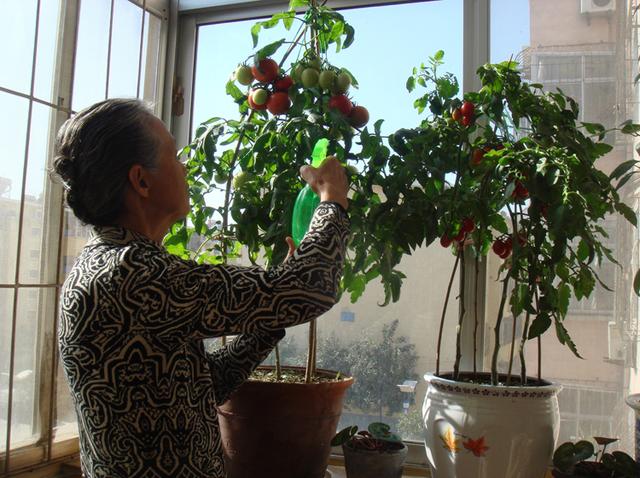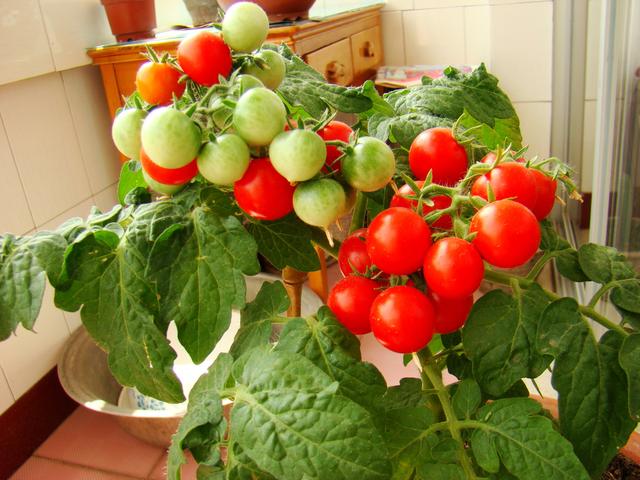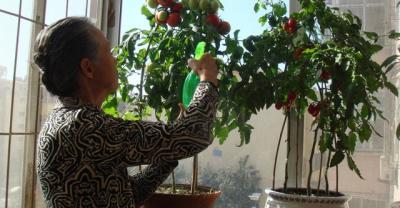It's easy to grow tomatoes on the balcony!
Now all the vegetables on the market are pesticides, so you can't rest assured that you can eat some, but the nutrients in the vegetables must be replenished. What should we do? You can plant it on the balcony by yourself. Small tomatoes are fruits and vegetables that can be planted on the balcony. In addition to the yellow flowers, you can also see the process of gradual discoloration of the fruits. And today's tomatoes in addition to red, but also have yellow, orange and other rich colors, it can be said that people can not wait to plant, want to meet the harvest day of vegetable pot planting as soon as possible. The following briefly introduces the planting methods and matters needing attention of tomatoes on the balcony.

Planting method of tomato on balcony
1 sowing and raising seedlings
Home-grown tomatoes can be directly sowed and raised seedlings, or the seeds can be soaked in warm water of 50-55 ℃ for 10-12 hours and then sowed in flowerpots. Before sowing, put the prepared nutrient soil into the flowerpot, 3~4cm away from the edge of the pot, pour through the water, and sow seeds when the soil is slightly dry. If multiple plants in a pot can sow 1 or 2 seeds at intervals of 10~15cm, the seeds will be evenly covered with 0.5cm substrate and covered with a layer of plastic film, and the plastic film will be removed after emergence. After sowing, the temperature was controlled at 20: 28 ℃ in the daytime and above 10 ℃ in the evening. Water should be properly controlled a few days before entering the basin.
2 into the basin
When the seedling reaches 3-4 leaves, it can be transplanted into the pot. Before entering the pot, wash the flowerpot, place tiles or fill it with nylon yarn in the bottom hole of the pot, and load it into the pot soil. Use a horticultural shovel to dig out the seedlings around the 5cm around the root system of the original pot, and the depth should not be lower than 8cm. Plant the seedlings with soil blocks into the pot, straighten the plants, and gently shake the flowerpot. Immediately after planting, pour water thoroughly until water seeps from the basin hole.
3. Daily management
Water management: after the tomato is put into the basin, water is watered once, and then watered every 3-5 days. Control the amount of water before fruit setting and keep the basin soil moist during the fruit expansion period.

Matters needing attention for growing tomatoes on balcony
I. temperature control
Put it in a cool place for a week, and then put it in the sun. Don't pour too much water. You should add some base fertilizer when planting. If the temperature is low, you will die. Only by planting one tree in a pot can it grow well. Transplant to bring soil balls, do not immediately bask in the sun after planting, after 1-2 days. It is best to use rotten leaf soil and a little gravel, put it in the open air, and tie it with a stick to support it when it grows taller.
II. Water and fertilizer management
When the seedlings grew to 6 leaves, the tomatoes were put into the pot and watered once. After 20 days, 100 grams of expanded chicken manure or sesame sauce dregs were applied to each pot, fertilized every 10 days, and watered once every 3-5 days. Control the amount of water before fruit setting and keep the basin soil moist during the fruit expansion period.
Third, pruning technique
1. Continuous coring according to the strong growth potential of tomato, the axillary buds on each side can form branches, blossom and bear fruit, double-trunk and three-stem pruning can be carried out, and the growing point can be removed when the plant is about 80 cm high, so that the plant is short, strong and the fruit is mature. In the cold winter, when the indoor temperature and light are suitable, potted tomatoes can also produce fruitful tomatoes.
2. Twisting branches, picking leaves and breaking branches can increase the bearing capacity of basic branches, improve the seed setting rate of each pot of tomato, and make it evenly transparent, so as to promote fruit ripening. Twisting operations should be carried out in the afternoon on sunny days, and never on rainy or sunny mornings. Picking leaves is to make the ear sit on the surface of the basin as far as possible, and the yellow old leaves and branches at the base should also be removed in time to facilitate ventilation and light and reduce nutrient consumption. Forking is also for modeling, to promote plant growth and fruit expansion, so that the fruit can be colored by light.
3. give full play to the characteristics of unlimited growth of potted tomatoes in winter, put potted tomatoes in a closed balcony or living room, and hang a plastic rope to pull a branch of potted tomatoes upward to climb, so as to make full use of the space for more flowering and fruiting. A tomato with four vines is planted in a flowerpot with a diameter of 17 cm and a height of 12 cm. After the long vine fruit is harvested, the head can be changed and the fruit branches can be renewed. Potted tomatoes such as self-capping varieties can save the coring process, nutrients can be more concentrated supply of fruit, the effect will be better. However, the use of unlimited tomato varieties, through multiple heart-picking and head-changing, can also achieve good results.
IV. Disease and pest control
Potted tomato diseases and insect pests are very light, because the air in the room is dry, we should pay attention to spraying water and 0.5% potassium dihydrogen phosphate to the leaves, or spraying 100 times of rice vinegar every week, which can prevent pests and diseases and play the role of foliar fertilizer. Spraying low-toxic and odorless pesticides every 10 days can control the occurrence of diseases and insect pests.
Finally, favorite tomato and egg noodles.

Official account of Wechat: tangzhe365
- Prev

Pot planting method of towel gourd
In recent years, deeply affected by food safety problems, many people use their own idle balconies, because the balcony space is limited, so potted plants.
- Next

Foliar fertilization for orchid planting
Orchid foliar fertilization, also known as extra-root fertilization, has the characteristics of less fertilizer, fast absorption and strong pertinence, which can prevent and cure element deficiency, enhance orchid plant growth and disease resistance.
Related
- Fuxing push coffee new agricultural production and marketing class: lack of small-scale processing plants
- Jujube rice field leisure farm deep ploughing Yilan for five years to create a space for organic food and play
- Nongyu Farm-A trial of organic papaya for brave women with advanced technology
- Four points for attention in the prevention and control of diseases and insect pests of edible fungi
- How to add nutrient solution to Edible Fungi
- Is there any good way to control edible fungus mites?
- Open Inoculation Technology of Edible Fungi
- Is there any clever way to use fertilizer for edible fungus in winter?
- What agents are used to kill the pathogens of edible fungi in the mushroom shed?
- Rapid drying of Edible Fungi

